Deceit
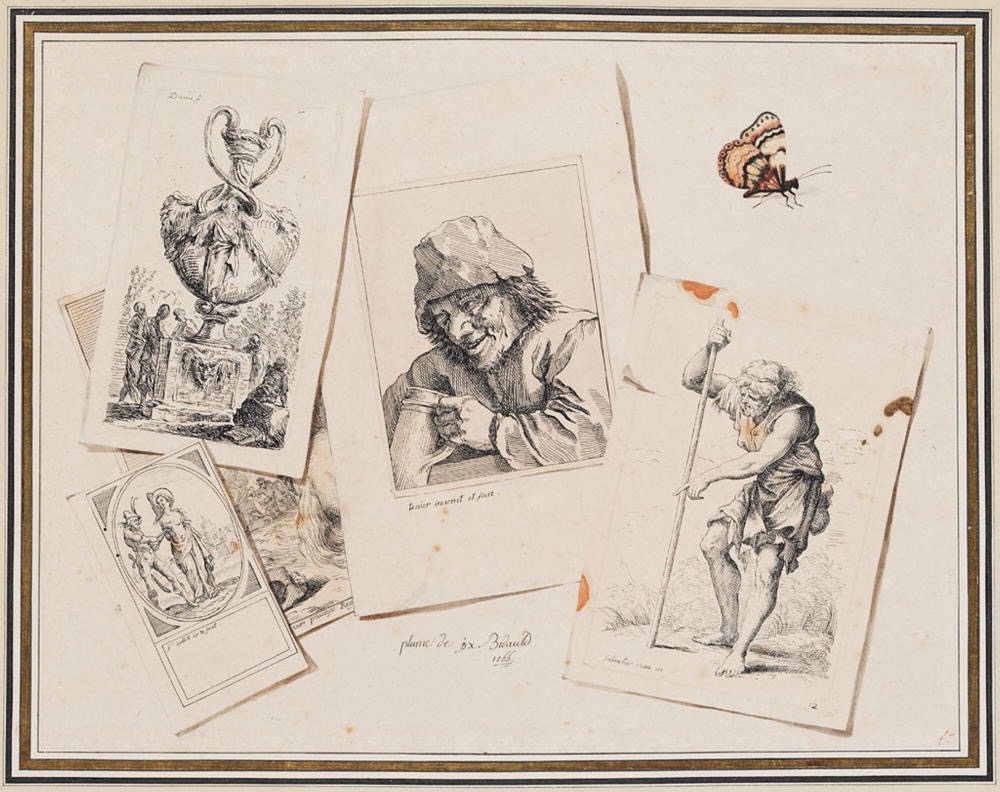
Jean-Pierre-Xavier Bidauld:
Trompe l'Oeil with Prints and a Butterfly (1766)
"Not even that frenzied moment will last forever."
Perhaps the truest test Decency ever encounters occurs whenever it tangles with Deceit. Deceit deliberately misrepresents. If Decency strives to be on the up and up, Deceit insists upon the down and down. Deceit distorts its position, which effectively negates the possibility of successful negotiation. Deceit doesn’t care so much about winning any particular engagement as long as its opponent loses. It knows no shame. It blames. It shamelessly defames, deliberately leaving Decency in a lurch. Each violation serves as another invitation for Decency to let down its defenses and compromise itself. Deceit wins when it successfully recruits Decency into its ranks. Each invitation might serve as a successful seduction if Decency were in any way similar to Deceit. It isn’t.
Still, it’s difficult for even the most disciplined Decency to quietly sit by while Deceit sways public opinion again.
Persistence

Thomas Cowperthwait Eakins: Miss Alice Kurtz (1903)
"Will we persist with our damning decency even then?"
From A Threatened Portland, Oregon, On The Morning It Appeared Our Incumbent Relented Before His Assault Could Begin, Realizing He Couldn’t Possibly Win.
The ICE agents look like children engaged in pretend war games. Armed with ridiculous-looking paintball weapons loaded with pepperball ammo and wearing silly face coverings, they appear anything but threatening. They scream without provocation, thereby disclosing just how terrified they must feel inside. Their opponents bring Persistence to the game rather than pretend weapons. They take their licks as administered by the undisciplined troops. They curse but rarely really resist. They go flaccid when assaulted, rendering their attacker powerless to influence. They persist instead. It slowly becomes evident that the scare tactics aren’t working; the protesters seem unaffected by the vague threats and meaningless curses, which fail to carry much evidence of underlying malice. This is performance, mugging for unseen cameras. Nobody is willing to suspend their disbelief, not a freshly installed officer or a vastly more experienced protester. Everyone knows who wins these kinds of confrontations.
The ICE agents might just as well be punching pillows for all the difference they’re making on the peaceful and royally pissed-off citizens.
DecencyDemanding
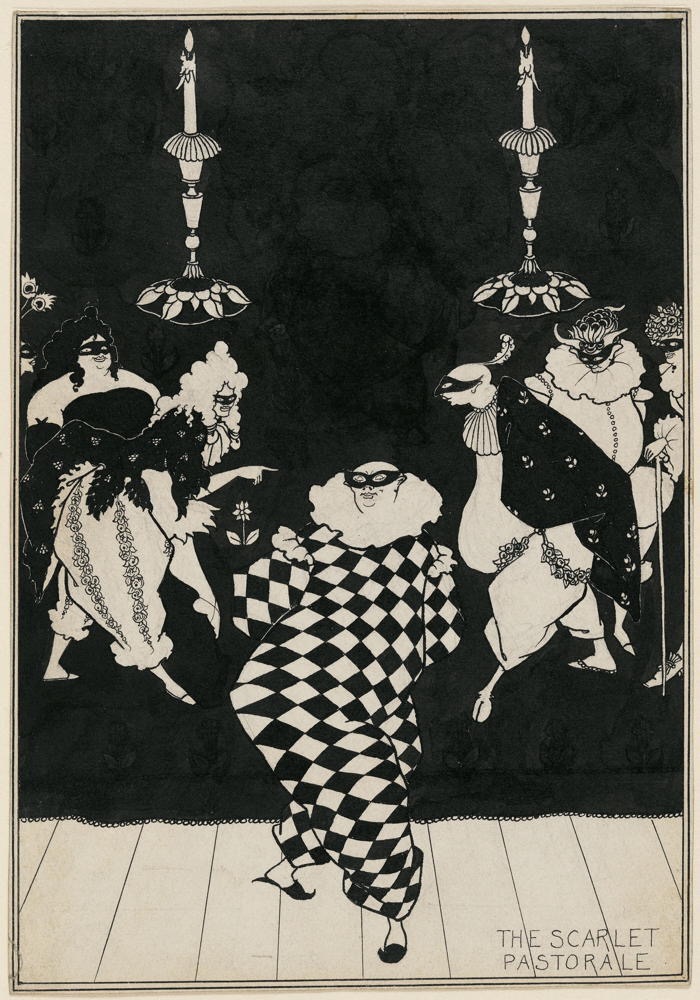
Aubrey Vincent Beardsley: The Scarlet Pastorale (1894)
"…those of us daily struggling to live decent lives in these extraordinary times."
What does Decency demand of me now? This seems to be the question reverberating in my head most mornings. I find no definitive answer. If I were a martyr, I might more easily find such a response, for I would know without a doubt that Decency desperately desired me to become a victim to whatever provocation I might encounter. But Decency does not seem to want me to be placating situations. It wants me to be true to myself, too, to stand up for something. It sometimes seems that my Decency and I are witnessing especially horrible provocations, ones specifically engineered to elicit something approaching my very worst responses. They seem to desire my anger. They frustrate me with double-binding insistences. They do not appear above outright lying just to bring out my worst responses, and, believe me, I have been frantically sorting through alternatives. The Decency question resonates even more strongly the longer I consider my options.
The eight-year-old in office has mastered nothing more interesting than fabricating.
Situationalism
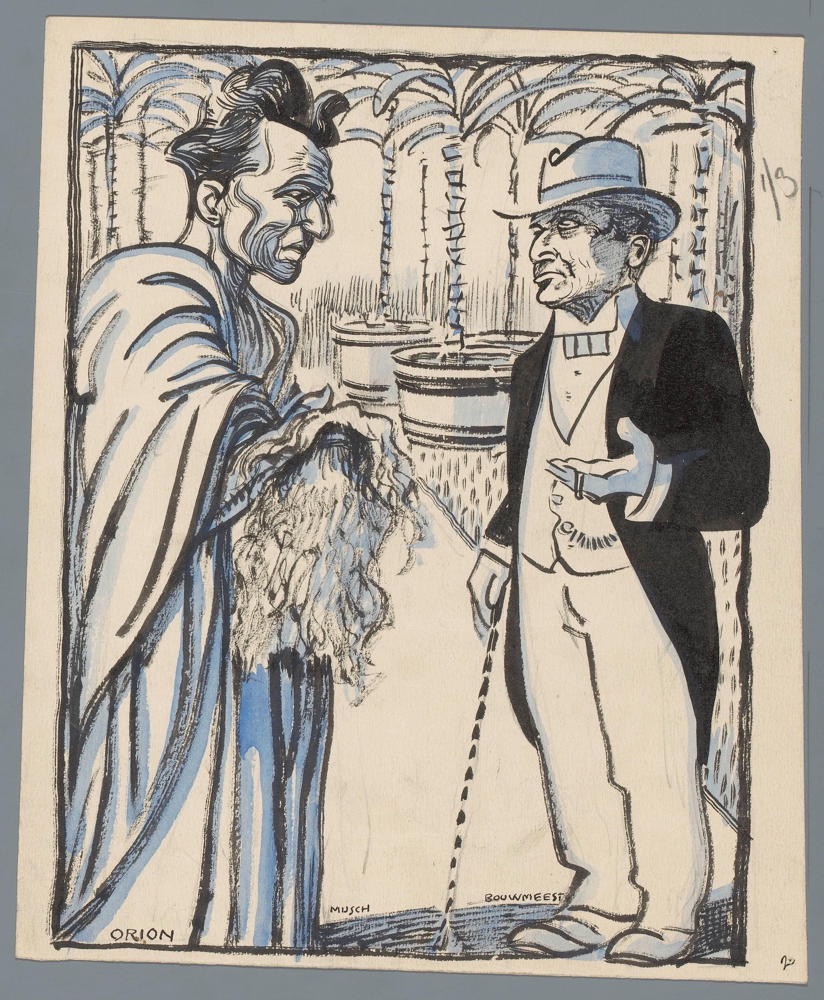
Patricq Kroon: Musch and Bouwmeester (1900 - 1924)
The actors Jan Musch and (Louis?) Builder in conversation with each other. Design for a cartoon in the newspaper.
"Perhaps I should be indicting myself."
Maybe Decency should only be exercised situationally. Perhaps it’s a Sunday sort of behavior. Certainly, considerable ambiguity surrounds its appropriate use. One might not want to waste any on enemies, for instance. Perhaps only certain people are qualified to receive it, and maybe not everybody’s fully certified to properly dispense it. Maybe it requires some skill to properly deploy. Should rank amateurs even be allowed to engage in it? What if they were to accidentally extend some Decency to someone unqualified to receive it, someone, for instance, who couldn’t properly appreciate it? Couldn’t the resulting misunderstanding leave the world worse off for the experience? Might indiscriminate Decency cause real and lasting damage, not only to the practitioner but also to the unwitting receiver? What if we inadvertently spoil some hapless receiver into expecting to always receive Decency in a naturally hard and increasingly indifferent world?
I might needlessly worry about such questions.
Weekly Writing Summary For The Week Ending 09/25/2025

Jack Gould: Untitled [woman writing numbers on blackboard] (c. 1950)
We Must Embody It Now
Imaginary Enemies might be the most virulent kind. There’s no physical way to defeat them. They can only ever be conquered by other means, often through cognitive means. This means that those most likely to conjure up Imaginary Enemies usually prove to be the ones least able to vanquish them. They escalate defensive measures far beyond reasonable levels instead, often inflicting greater damage upon themselves than any enemy, imaginary or actual, could ever manage. Failure to deflect the imaginary only rarely uncovers the illusion, for only clear victory could convince the thoroughly deluded, and Imaginary Enemies wickedly withhold such clarity. It seems as though a clever conspiracy prevents unambiguous evidence from emerging. The afflicted slowly suffocate in their own ambiguity, chasing shadows of their own activity, unable to distinguish between actual and imagined.
A grave injustice might prove to be the only means by which Imaginary Enemies are ever vanquished.
SearchingForDecency

Antonio Tempesta: Canens Searching for Picus (1606)
"It seems likely to be taken down by defensive friendly fire."
Hoping to gain a better understanding of Decency, I initiated a Google search for “Decency In The News.” I received in return references and explanations that didn’t even attempt to define Decency, or even to provide current examples of it in action. I found instead lengthy descriptions of what Decency isn’t, how it so often seems missing from online conversations, and how Section 230 of the Communications Decency Act has done little to encourage Decency in online forums, though it has successfully shielded platform owners from lawsuits for such offenses as third-party slander and copyright infringement. “Reports about ‘decency’ in the news consistently focus on its erosion in politics and society, though the Communications Decency Act also remains a topic. Current conversations often frame a decline in decency as a symptom of deeper societal issues like incivility and political polarization.”
One deeper societal issue, aside from the obvious incivility and political polarization, might be the apparent unspeakability of Decency.
ReWired

Lee Russel: Trailer of itinerant electrician near Pharr, Texas (1939)
Farm Security Administration Photographs
The Miriam and Ira D. Wallach Division of Art, Prints and Photographs: Photography Collection, The New York Public Library. "Trailer of itinerant electrician near Pharr, Texas" New York Public Library Digital Collections. Accessed September 24, 2025. https://digitalcollections.nypl.org/items/8e15f900-c4fb-0136-ce6e-438981b45b1b
"…it might take such work to set the circuits straight again."
I realize that I have been ReWired. Whether I believe the bullshit or not, and perhaps especially because I don’t believe it, either conclusion could serve as evidence that a successful rewiring has occurred. I wish, and even pray, in my curiously agnostic way, that this situation were otherwise, that my defenses had not been compromised, but I have lately realized that there was no avoiding this experience. Yes, I refused to watch Fox from its inception, except for a few otherwise inaccessible baseball games they alone televised, because I firmly believed that exposure to that poisonous content might rewire my judgment. I had not suspected that just deciding to tiptoe around it was also evidence of its backhanded success. Its premise might have scared me off, but it also motivated me to build a fence around my property to maintain an isolated Dignity, when Dignity rightfully knows no such boundaries.
The insidious nature of shriveling morals affects even the morally steadfast.
D-Scrolling

Sebald Beham: Little Buffoon with Scroll (1542)
"Curious how there's so much more effort expended trying not to do something than there ever is to simply repeating it."
We refer to this activity as Doom Scrolling, the practice of aimlessly perusing online media. The scrolling part of the term seems more self-explanatory than the doom portion. The doom comes from the general content found on social media. It tends to be overwhelmingly focused on the catastrophic. On slow news days, plenty of past catastrophes appear to hold the space. Scientists—real scientists, not the phony ones currently enjoying a resurgence on social media—suggest that each exposure to a report of some catastrophe incites something in our brain to dispense an addictive substance that encourages us to continue engaging in the hope of stumbling upon another similar report. Doom apparently better excites the amygdala suspected of dispensing this addictive substance than do more uplifting kinds of content. Fuzzy kitten and fluffy baby duckie pics work to some extent, but apparently not nearly as well as catastrophe.
It's nothing personal.
Decency

Follower of Jan Massys: Two Peasants Looking at a Mirror (c. 1550)
"I will be investigating this notion between now and just before Christmas."
We insist that we are decent people, charitable to a fault. We rail against indecency as if it were the obscenity it always was. Yet we engage in the occasional absolutely indecent activity. We're currently, under the direction of our administration, which, thankfully, cannot administer anything, deporting people without due process. They're initiating, in our good name, a raft of initiatives Decency prohibits. Yet they're still proclaiming from every pulpit just how deep down Decent they are, and we remain.
Maybe Decency is something other than what we've always assumed it was.
Revisiting
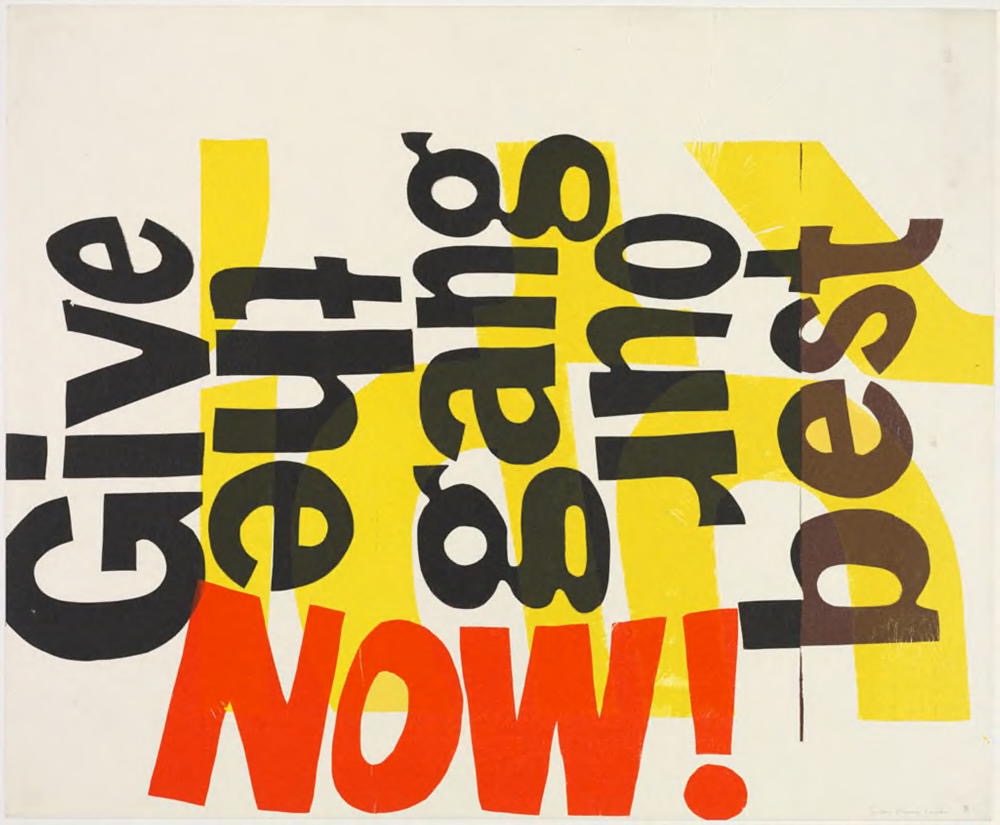
Corita Kent (Sister Mary Corita): give the gang our best (1966)
"…genuinely inept actors."
I ask myself which FollowingChapters Story might be "the best" without really expecting anybody to answer my question, let alone myself. The question itself seems irrelevant because I never intended there to be any competition between them. Sure, some seemed better and others worse at inception, but often, the stories that seem the worst to me when creating them attract the most positive attention once I post them. My nose seems reliably unreliable. But then, I do have my favorites, the ones that seem the most resonant and those that surprised me, even a few that delighted me. It's noisy at my writing desk when I'm writing and even noisier when I'm reading through what I've just finished, then noisier still when I'm compiling a series of pieces into a comprehensible whole. And even noisier, though this never seems possible, when I sit down to peruse what I've compiled, reading through the collection for the very first time.
How many times might I need to read through the whole collection to pass fair judgment upon the whole, let alone to gain enough traction to definitively choose one story as "the best?"
FollowingChapters: Series_Recap

Utagawa Hiroshige 歌川広重: Asakusa Ricefields and Torinomachi Festival
(Asakusa tanbo Torinomachi mōde), from the series One Hundred Famous Views of Edo
(Meisho Edo hyakkei) (1857 (Ansei 4), 11th month)
With Liberty Tagging Along I began this FollowingChapters Series after spending the prior two quarters writing a series I’d titled NextWorld, in which I attempted to predict how my world might change under the upcoming and now current administration. I’d then completed a series I’d titled CHope in which I tried to maintain hope that my world might not be completely demolished by near absolute idiocy, somewhat successfully. Then I faced a next quarter. What would be my writing focus then? I chose the title FollowingChapters because, from my perspective at the time, I couldn’t foresee what might exist after I’d successfully investigated my NextWorld and projected much Hope. I’d enter my FollowingChapters.
Slip over here for more ...Weekly Writing Summary For The Week Ending 09/18/2025
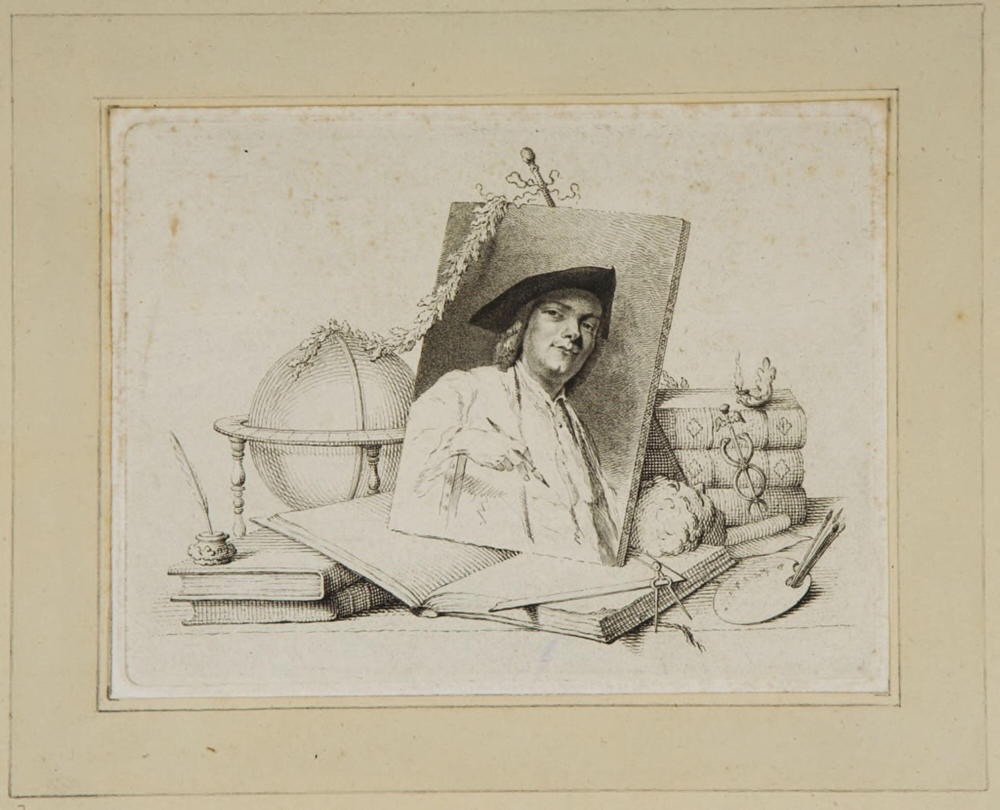
Reinier Vinkeles: Cornelis Ploos van Amstel (18th century)
And Win Every Morning
This is how my thirty-third series ends, as they've all ended, with more of a whimper than a bang. I consider stories that build to a satisfying climax to have been engineered to yield that effect. Since this and every previous entry in my series focused more on my actual experiences, I couldn't engineer such plotlines. I could draw conclusions, however preliminary, but I could never actually know how any of my stories would ultimately turn out because the meta-story I was inhabiting had to remain ongoing; otherwise, their author couldn't be present to create the current installment. Or the next. Life works like that.
With each ending comes the question of whether I'm really up for another beginning.
Irony

Attributed to Cornelis Anthonisz.: The wise man and the wise woman (1540 - 1545)
"Imaginary performance. Man and woman with all their attributes, represent many virtues and biblical metaphors. A woman with horse legs and hooves holds in her right hand a stand depicting the crucified Christ and in the other hand a can, a lock on her mouth, a dove on her chest and a snake around her waist. Man with compass and scale and dog at his feet. Left and right of the presentation text in Dutch."
"These lessons will be lost on even the very best of them."
The proper administration of Irony requires something other than mere administrative or standard leadership skills. It first demands of its incumbent a sincere dedication to obliviousness. This requires the opposite of focus. One must also be more than merely capable of producing endless streams of serious non-sequiturs, but possess the parallel ability to never once catch just how self-disclosing these seem to everyone else. One must also maintain multiple hidden agendas that remain open to public acknowledgement, ensuring everyone understands their purpose better than their creator. The entirely successful incumbent will pick fights he cannot possibly win, only to pick additional fights whenever it's clear he's lost. He must never admit to any wrongdoing and must convince himself, if only ironically, and nobody else, that he's not the biggest loser to ever hold office. Above all, the obliviousness must be sustained at all costs. Undiagnosed cognitive dysfunction, a definite plus.
Sycophancy also seems a must for the proper administration of Irony.
Corrupting
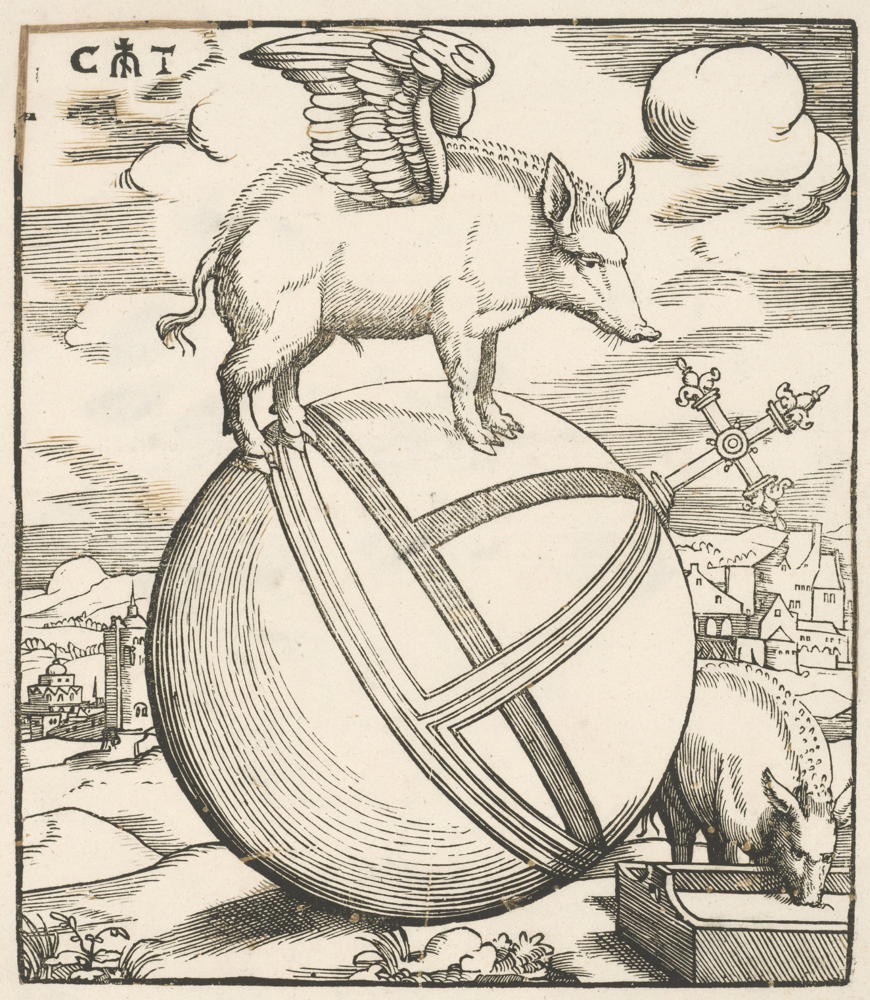
Cornelis Anthonisz: The winged pig in the world (1541 - 1545)
Allegory of the corrupt world: winged pig standing on imperial apple.
Second pig eating from trough.
"Those who insist upon living in glass houses must restrain their public actions."
Few crimes seem more misaligned than corruption. Those to whom trust has been extended betray something more than that trust when they engage in Corrupting behavior. They corrode themselves first. Stealing from the public purse seems much worse than any other sort of burglary. Violating simple comportment rules can quickly become complicated. A twisting occurs, first of ethics and later, of respectability. Those who profit from their service are rightly seen as beneath contempt. No excuse ever erases the stain. No apology ever undos the well-deserved disdain. Those who believe themselves to be above the law demonstrate only how far below it they've fallen. Bottom feeders deserve the dregs.
Our current administration conducts a master class in corruption.
Loose_Talk
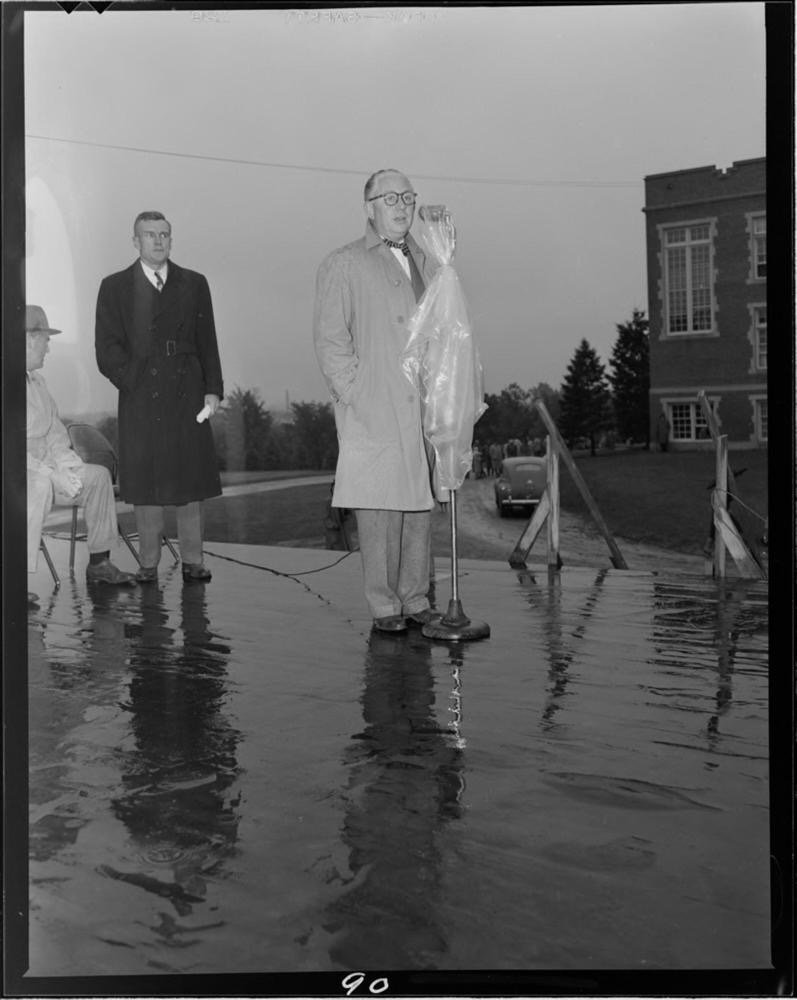
Lucian and Mary Brown: Untitled [man giving speech in rain] (c. 1950)
"I just wonder why."
This country was founded upon the ideal of Free Speech. In practice, it has always struggled to draw the distinction between Free Speech and Loose_Talk. Free Speech suggests that one might feel free to say anything they care to say to or about anybody. Civil discourse, of course, demands a few dampers be placed upon the full and, dare I suggest, free expression of observations. Likewise, simple civility might also suggest that certain speech be squelched lest someone take offense or choose to be offensive. Mark Twain suggested that while we might have the freedom to speak our minds, however addled, we also hold an overweening obligation not to, or not to very often. The distinction between Free Speech and Loose_Talk resides in the ear of the listener, though most speakers might understand where one begins and the other ends for themselves, if not necessarily for any other. Libel laws are notoriously difficult to enforce. Same with slander.
It's apparently not nearly enough to insist that individuals must carefully edit their utterances.
Persevering
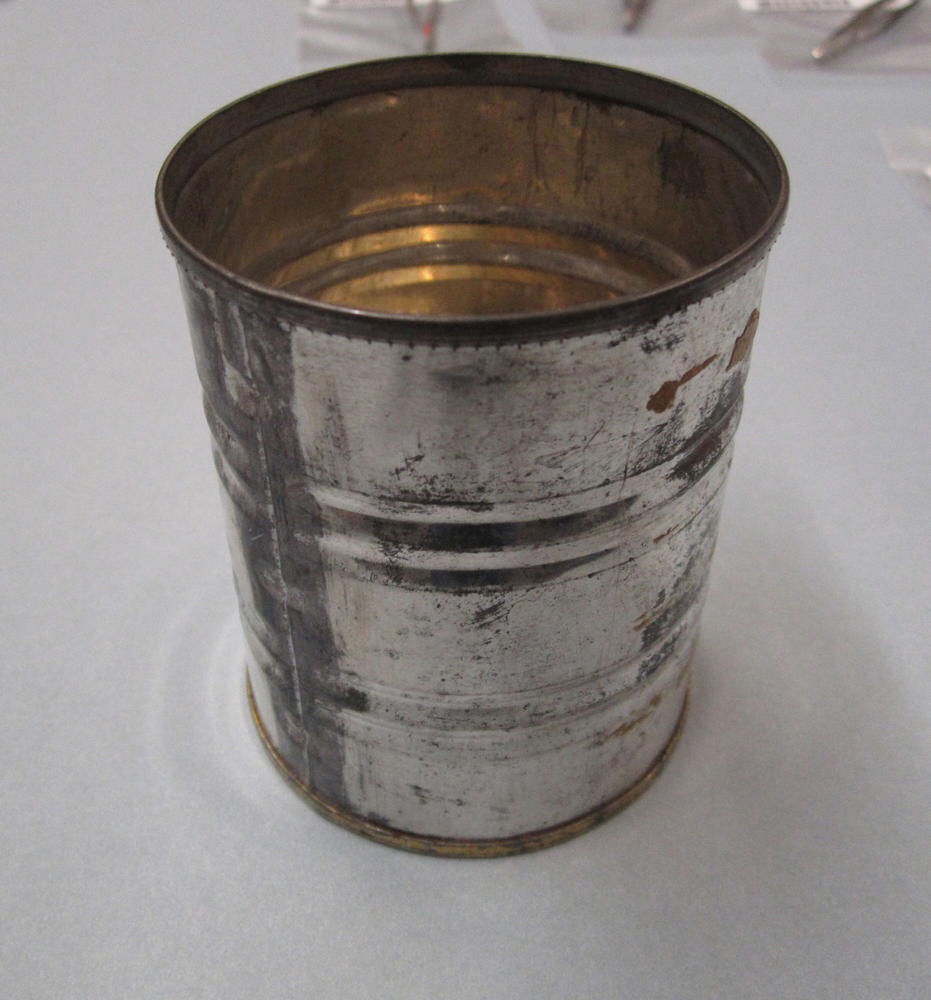
Tin can formerly containing tweezers: Archival Material (20th century)
Aluminum, Dimensions 8.3 x 6.9 x 6.9 cm (3 1/4 x 2 11/16 x 2 11/16 in.)
Collection of Barnett and Annalee Newman - Estate of Annalee Newman -
The Barnett and Annalee Newman Foundation -
Harvard Art Museums/Straus Center for Conservation and Technical Studies,
Gift of the Barnett and Annalee Newman -
Exhibition History: Barnett Newman: The Late Work, Menil Collection, Houston,
03/27/2015 - 08/02/2015
"…still as fresh as they day they were preserved, Persevering."
Every Late Summer since we coupled, The Muse and I have practiced Persevering in the form of preserving. I suspect it was no accident that these two terms so closely resemble each other, for the purpose of our preserving has always been Persevering, for we are accomplishing more than merely "putting up" some produce. I always sense myself back in my mother's kitchen receiving instructions on how to slice a pear in half against my thumb—a task I'm still too squeamish to blithely perform, for I fear I'll cut myself, though I never have. The very act of attempting to Perservere preserves something in addition to the fresh produce we will consume through the upcoming winter. We preserve a seemingly fading lifestyle, a passing, nearly past imperative, one that sustained generations before ours. We ache to reprise this dance each year, and so we do.
It was always inconceivable for us to miss performing this sacrament.
Cadency

Léopold Survage: Plate V
[Rhythmes Colorés: Cinq Lithographies Originales in Couleurs
(20th century)
"My presence will be best represented there in the future by my absence."
The Muse and I went to dinner last night with a group from a local alumni association. This group does good works, and our host helps. In addition to their good works, they also organize these suppers where three or four couples gather to share courses and conversation. We were responsible for the appetizer course. The Muse made some fancy crackers adorned with goat cheese and Mirabelle jam. She also made some icy hot gazpacho to serve as soup. Another brought a salad, another wine, and another a rhubarb pie. Our hostess made a casserole with deplorable green beans that were overcooked, leathery, and nasty. Fortified and distracted, we commenced to attempt to conduct a conversation around that table.
The conversation did not go well.
Invitations

James Abbott McNeill Whistler: Invitation Card (1882)
"I am not one of them."
I feel baffled by the odd attraction some seem to feel about the Invitations that MAGA characters offer. It appears as though they extend permission for others to engage in whatever truly awful behavior they might have previously felt constrained against, as if they had been impatiently waiting to be offered entry into a genuinely despicable manner of living. I feel no such compulsion, and I cannot imagine any invitation that might convince me to flee into the dark side, but seemingly not so with the MAGA faithful. They immediately start spewing venom with the best of them. Hate speech seems to be their small talk, and bitter accusations, their typical conversation. It looks as though they've been granted grudges as a reward for their entry.
They seem to require near-constant reinforcement, as the media machine they subject themselves to repeats the same ugly memes like catechisms.
Weekly Writing Summary For The Week Ending 09/11/2025

Salvator Rosa: Five River-gods (1651-1656)
Won't Miss the Weeding
The rains finally came ten days into September. I was awakened by crashing thunder, flashing lightning, and The Muse rushing around slamming windows. I barely acknowledged this long-anticipated event before slipping back into one of my more satisfying sleeps of this evaporating season. The following morning, I walked around the yard satisfied that the gardens might survive even this latest endless swelter. I have reached the age where my sample size seems adequate to reach a few conclusions. I experience summers differently now than I did when I was ten and riding my bicycle around town half naked and berry brown. What was liberating then has become encumbering, a physical and emotional challenge, a survival exercise instead of endless play. With only ten days remaining before autumn arrives, I, too, might survive this summer. I will miss reading beneath a whispering ceiling fan and the early evenings with sprinklers cooling the yard. I will definitely miss The Muse's overflowing vegetable garden, though I won't miss the weeding.
God-Givens

Unknown Russian Artist, Tula:
Flintlock Fowling Piece Given by the Empress Catherine II of Russia
to the French Ambassador (1745 and 1763)
"So much for God's matchmaking skills, and others."
Recently, Virginia Senator Tim Kaine sparked controversy when he stated the seemingly uncontroversial opinion that rights come from laws. Conservatives, spear-headed by the ever-pious Texas Senator Ted Cruise, publicly disagreed, insisting that none other than Thomas Jefferson himself declared that people are bestowed by their creator certain inalienable rights, namely: the right to life, liberty, and the pursuit of happiness, accusing Senator Kaine of disclosing the "Democrat" agenda to ascribe God-Given rights to laws and thereby enabling them to be rescinded upon a whim. House Speaker Mike Johnson chimed in, insisting that while this was the well-known "Democrat" agenda, they weren't supposed to say it out loud. Here's The Hill's report on these exchanges.
This might seem to amount to little more than another vacuous gotcha game exchange between partisans, but it got me thinking about what constitutes a God-Given.
Likelihoods

Ben Shahn: Untitled [exterior of home, probably Arkansas] (1935)
"It almost seems as if I disappoint myself on purpose."
I survive the final fortnight of Summer by focusing on what I clearly do not understand. Weather predictions indicated a possibility of rain early this week, but this promise was barely fulfilled with a brief gust and a few scattered drops around sunset the day before yesterday. Another possibility appeared in yesterday's report, but that one also failed to produce. A forty percent chance of rain rarely results in very many raindrops here. Another part of the region must attract the weather through this season, because we don't, or we haven't. This might have something to do with the very nature of Likelihoods, which by their name seem to suggest that a stated outcome will prove likely. We might as easily classify these as Unlikelihoods, connoting the production of an absence, since Likelihood doesn’t always promise the mentioned outcome. A 40% chance of rain means that there's a 60% chance of none.
Even labeling such a prediction a "probability" connotes that something will "probably" happen, and it reliably does.
Stewarding

Urs Graf: The Parable of the Unjust Steward (1511 - 1515)
The Miriam and Ira D. Wallach Division of Art, Prints and Photographs: Print Collection, The New York Public Library. (1511 - 1515). The Parable of the Unjust Steward Retrieved from https://digitalcollections.nypl.org/items/9dfc8bf0-a38f-0134-34b1-00505686a51c
"My conscience should leave this season aware of my shortcomings and successes."
Everyone in this world has the same job, the identical responsibility that transcends their occupation, profession, and "real job." Likewise, we hold responsibilities before and beyond mere ownership, however much or little we might manage to accumulate. Rich or poor, high or low-born, we remain steadfastly equivalent from birth until we die. We are each first and foremost Stewards.
Ownership might be an encumbrance to stewardship, since it suggests some forms of authority over property.
GettingOver

David Rees: Cannonball Press
Get Your War On (2004)
"Aspiring for the impossible never makes it happen."
Eventually, the tin pot dictator's proclamations take on the distinctive scent of irony, irony utterly lost on him, of course, but, increasingly, not lost on almost everyone else. He becomes the parody he always was, finally even in his former partisans' eyes. His plans seem absurdist and not only because they virtually never turn out as announced. Eventually, few, if anybody, can even imagine how they might have ever worked. When the advertised revolution can no longer quite qualify as believable fiction, society widely releases a collective sigh, clear evidence that we can begin GettingOver another sorry chapter.
We have had many sorry chapters to get over in our past.
Grieving

William Holman Hunt: The Triumph of the Innocents (1870-1903)
"They will fail, but they sure enjoy being cruel."
I believe evangelism constitutes a much greater sin than paganism, but then I do not believe paganism qualifies as sin. I believe the separation of church and state has always been a moral issue, as linking church and state constitutes an immoral act. Prayer breakfasts exist so hypocrites can enjoy debasing themselves at public expense. Prayer in schools seems roughly equivalent to enforcing public pooping since it demands public performance of the properly private. I believe the urge to punish debases the punisher much more than it punishes the perpetrator. When I was fifteen years old, I held an after-school job that paid me the equivalent of $21/hour in today's currency. I was able to pay for my books and tuition when I attended university with a small Pell grant and the proceeds of my after-school jobs. I graduated debt-free.
I grieve for a world I failed to appreciate fully, before genuine pieces of shit took office and overran the Republican Party.
CrazyPeople
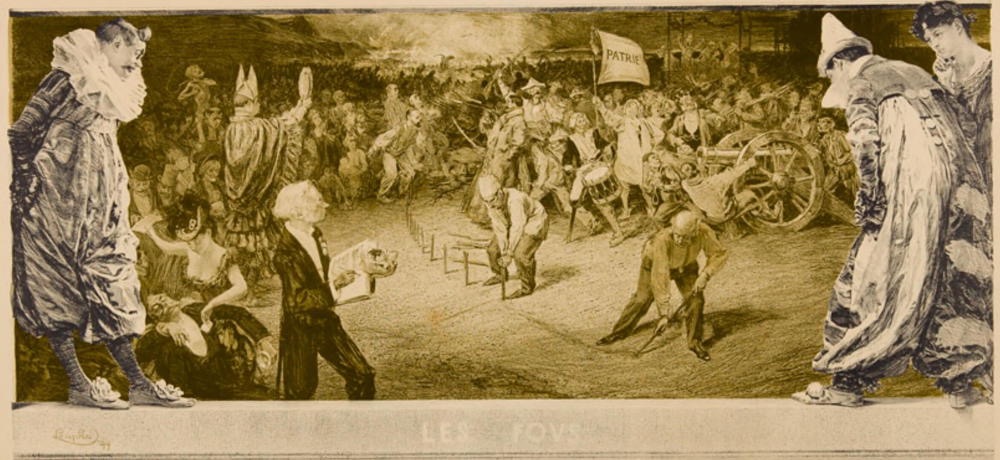
František Kupka: The Crazies (1899)
"They possess only the strangest of strange attractors."
It's never what they do to themselves or to me that bothers me so, but what I tend to do to myself in their presence. It's as if their superpower lies in compromising better angels, defying reason and logic to garble even the worst of intentions. I cannot get my reactions straight. I feel furious before I acknowledge that they cannot help themselves, that that's the crux of their disease. They cannot help themselves, and I cannot help them, either, so I'm rendered helpless. If I didn't care, this couldn't ever hurt me so much, but I can't seem to help but care. Therein lies the whole game, with me competing on both teams. I wrestle with myself, with my own damning demons, while they seem blithely unaware of the calamity surrounding them. If pressed, they always blame the innocent. If charged, they can't help but plead not guilty.
They violate underlying covenants without acknowledgement.
Weekly Writing Summary For The Week Ending 09/04/2025

Unidentified Artist (Walter Gropius):
"Aluminum City" Housing, New Kensington, Pennsylvania, 1941-1942
(c. 1942)
Gifted Us With The Experience
One of this week's stories recounted how a U-Haul truck we'd rented broke down, stranding us at a remote truck stop along the Columbia River. It was a hundred degrees as we sat waiting for the rental company to respond to our plight. We overlooked a line of diesel pumps and an ever-shifting set of semi-trucks. Each driver in turn would use a long-handled brush to wash their windshield before pulling their rig forward and shuffling off to the sandwich shop inside. Most were dressed in cargo shorts, a short-sleeved tee shirt, and open-toed crocks, a surprising wardrobe for what I thought would seem like tough truck drivers. They looked like they'd been lounging beside a pool instead of hauling freight along the historic Oregon Trail. The Muse and I shared a pleasant afternoon watching those proceedings, occasionally wandering inside to use the restroom or stretch our legs. I'd passed this truck stop innumerable times over the years without feeling moved to stop and experience the operation. By late afternoon, we heard from a tow truck driver, learning that he'd arrive in another hour. We drove to a little roadside dive for supper. That place, too, I'd passed by for more than fifty years without ever feeling curious enough to stop. Supper was regrettable but edible. We sped home in fading light, arriving just ahead of the tow truck driver, who unloaded the rented box truck and headed out for his three-hour return trip to his garage. Our summer had been missing a breakdown, but we'd never suspected until the universe gifted us with the experience.
SecondOrderStupidity

Gregorius Fentzel:* The Three Orders of the Human Race
Alternate Title:
The Combination of Church and State to Govern the People
Series/Book Title: The Triumph of the Four Cardinal Virtues
(17th century)
*[Gregorius Fentzel was a German copperplate engraver active in Nuremberg during the mid-17th century. Few details of his life are known, and his works are primarily based on the designs of other artists, most notably the Flemish painter Maerten de Vos.]
"…acknowledging just how first-order stupid even the brightest of us can seem."
These times exhaust me. Previously, I recall reassurance as a nearly constant reminder that civilization was not crumbling around us. However, nobody needs to go to all the trouble to become a pessimist to experience a continual sense of doom stalking them now. Some insist that this sense comes from a dramatic increase in the sheer number of stupid people. Where we used to produce people capable of brilliance, we now churn out vast numbers for whom even a basic level of competence seems unattainable. Authorities cite increasingly poor performance on standardized tests as prima facie evidence of the cause of our downfall, but I disagree with these questionable authorities, for they seem to suffer from the same disease as their studies' subjects. They exhibit second-order symptoms. In this instance, they exhibit abiding ignorance about their own ignorance. The lens through which they pass judgements seems cloudy beyond their personal embarrassment, rendering them decidedly worse than merely clueless about their condition, but SecondOrderStupid.
The SecondOrderStupid cannot conceive of their own more than obvious-to-everyone-else stupidity.
HaulingAssets
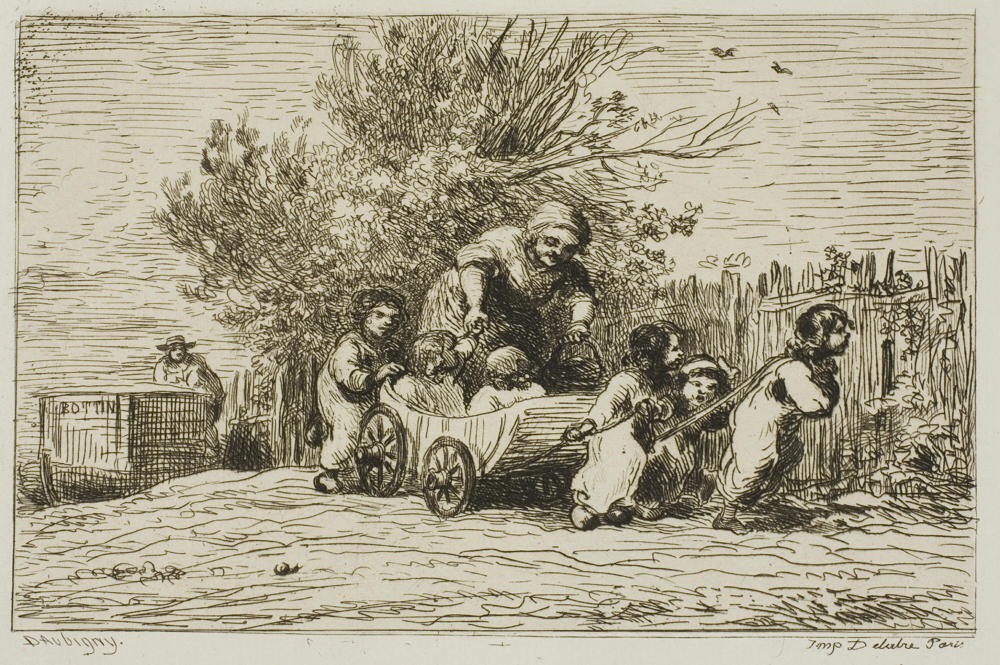
Charles François Daubigny: The Heritage of the Wagon
[The Children with the Wagon] (1861)
"…The Muse isn't certain what she wants to do with the furniture the new treasures will displace."
The pioneer tradition survives with the presence of a thriving wagon-lending industry led by a cleverly-named company: U-Haul. The name suggests that you do your own hauling, much as your post-Civil War ancestors loaded up their meager belongings and hauled their assets the better part of three thousand miles to Oregon. Then, one was expected to use their own wagon. Now, it's possible to rent one for the short duration of a modern migration. Who hasn't been shanghaied into helping someone move something or engaged in some shanghaing themselves? We maintain our treasures the same way we tend to acquire them, by carting them all over creation. I remember the time when my to-be first wife and I were able to easily cram everything we owned into the back of a Volkswagen Squareback Stationwagon. That was the last move either of us ever executed that didn't involve renting some wagon.
Those who rent wagons and vans tend to be the ones least capable of handling them.
Homes

Arthur Rothstein:
Home of Postmaster Brown, Old Rag, Virginia (1935)
"Every past inhabits just such a shadow visible when any prior owner drives past."
For me, home has not always been where my heart lives. It has been a place where I could usually rely on finding a clean pair of underwear and a decent breakfast. I considered most of those Homes, twenty-three by my accounting, safe haven for a spell, if not always necessarily comfortable. They included temporary housing when my life was in transition, and permanent housing that ultimately ended up being temporary. Duration of residence seems to have made little difference in how deeply or whether I permanently imprinted on the least of those places, for I imprinted on each and every one in turn. I must have always been a homebody at heart, a heart each home would eventually wound if not necessarily break. I still consider every place I ever lived "my home," even if I haven't set snoot or foot across its threshold in more than fifty years.
I'm one to want to at least drive by the place, only to not immediately recognize it, what with all the changes it has undergone in my absence.
Bagging

Shibata Zeshin: A bag (1866)
"…the world sure seemed to be her oyster."
I might be most skilled at creating complications for myself. This tendency never seems more present than when one of my grandchildren's birthdays approaches. Then, I feel compelled to live up to a little tradition of my own making, one that complicates what I might otherwise approach as a genuine celebration. (I reliably transform this opportunity into an obligation, and not just any odd old one, either, but a genuinely impossible-to-fulfill one.) Where I might have penned a small, short poem to the celebrant, tradition calls for a full-blown Bag Poem. A Bag Poem typically covers both sides of a paper shopping bag and runs three or four stanzas.
I never know where to start, though I have more than a decade of experience creating these.


